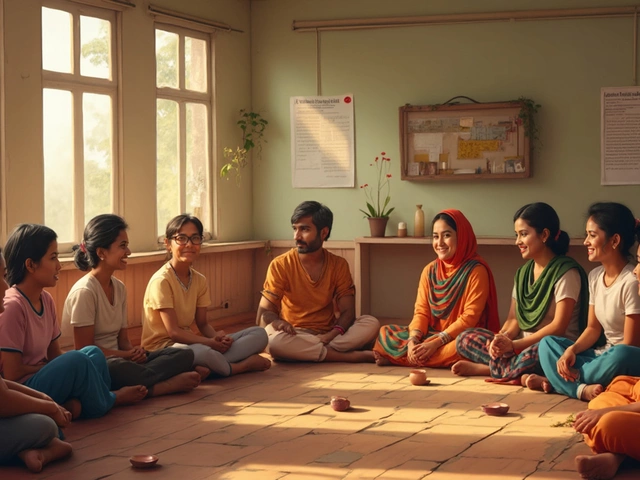Ask anyone in the UK today to name a mental health charity, and chances are, 'Mind' is the first thing out of their mouth. But does brand recognition actually mean that Mind is the leading force in tackling the messy, complicated business of mental health? The truth is packed with both success stories, raw opinions, and more than a little debate.
The Rise of Mind: How a Charity Became a National Name
Go back to 1946, and you’ll find the roots of Mind, originally called the National Association for Mental Health. Back then, mental health was taboo, hush-hush. Mind threw the doors open, campaigning and quietly supporting people when few others dared. Through the 1970s and ’80s, they started to get loud: protests, pamphlets, real-world activism. Their blue-and-white logo is now everywhere—in your GP’s waiting room, on TV charity telethons, even trending on TikTok in mental health awareness campaigns.
Numbers tell a big part of the story. Last year, Mind supported around 3.7 million people across England and Wales through crisis phone lines, local hubs, and online resources. Not too shabby when you realize the current population for those areas is just over 60 million. They also have over 120 local Mind branches—from bustling cities to sleepy villages—meaning there’s almost always a local group you can call on if things get tough. And it’s not all talk: Mind spends roughly £61.5 million annually on services, campaigns, and direct support, according to their 2024 Impact Report.
But it’s not just about numbers or money. Campaigns like Time To Change—run with Rethink Mental Illness—broke records for changing negative attitudes towards mental illness. Over a decade, this campaign claimed to have helped shift the needle on stigma, with millions saying they’d be more willing to talk openly about mental health at work, in school, and with their families. These stories aren’t just on glossy leaflets; they’re making real waves in workplaces and homes across the UK.
Of course, Mind is not operating in a vacuum. They face competition (and occasional partnership) from the likes of Samaritans, CALM, SANE, and Anxiety UK. Yet Mind has consistently led major government conversations, challenging policy, and shaping how mental health is treated in healthcare, at school, and at work. They even run accredited training programs for employers and NHS staff, aiming to ensure no one facing a mental health crisis falls through the gaps. Millions of people now have quick access to their online resources for everything from anxiety to eating disorders to suicide prevention.
So if we’re counting impact by people's lives touched, visibility, funding, or seat-at-the-table influence—yeah, Mind easily lands in the UK's top spot.
What Makes Mind Different—And Why Does It Matter?
There’s something specific about Mind that sets it apart from other UK mental health charities. At its core, Mind is user-focused. Their services are shaped not just for people living with mental illness, but often by them. The organization employs people with lived experience in many roles. They fund research not just from white-coated scientists, but from people with first-hand knowledge about what actually helps—peer support groups, community gardening, practical advice on debt or housing, even art therapy. This focus on empathy, rather than just expertise, is woven through their DNA.
They’ve pioneered peer support projects where people can connect in a safe space and share what works and what doesn’t. These groups run for everything from bereavement to managing bipolar disorder to help parents supporting children in crisis. And it’s Mind that regularly pushes GPs and local councils to accept that mental illness isn't always solved with a prescription. Gentle walks, buddy systems, creative workshops—these are on offer because real people said they wanted and needed them.
One of Mind's strongest moves is its ability to adapt. Take the COVID-19 pandemic: almost overnight, Mind switched much of its counseling and support online, building digital communities for people isolated in lockdown. They operated online chat support 24/7 for many months, rolled out video content for anxious parents and teens, and published simple, clear guides for coping with uncertainty—now downloaded over a million times.
And here’s a unique thing: Mind campaigns not just for the typically 'diagnosed', but also people simply struggling with low mood, stress, or burnout. Their resources now help everyone from students feeling the pressure of exams, to parents dealing with financial stress. By stretching their remit this way, Mind becomes accessible to anyone, not just those already in the system.
Staff are often praised for being welcoming and non-judgmental. Real people say they feel listened to—sometimes for the first time. "We need to keep fighting to make mental health visible everywhere," said Paul Farmer, Mind’s CEO until late 2024, in a Mind Annual Report interview,
"because everyone has mental health, not just a few who get a diagnosis."
Tips for anyone thinking of seeking support from Mind: check their website for local groups, use their helplines even if you’re shy (they’re trained for it), and don’t be surprised if someone follows up with practical help as well as emotional advice.

How Does Mind Stack Up Against the Competition?
There’s no shortage of charities working in mental health, and you might wonder how Mind compares to the rest. Samaritans, for example, specialize in suicide prevention and emotional support, running 24/7 helplines answered by trained volunteers. CALM targets men struggling with severe depression, suicide thoughts, or loneliness, often through big bold public campaigns. SANE offers emotional support and a research-led approach focused on serious, enduring mental illnesses.
Mind's real differentiator is range and reach. While Samaritans take countless calls for people in acute crisis, Mind works both at that front line and in changing the systems that create suffering in the first place. They pressure the government about benefits unfairly denied to people with hidden illnesses, campaign for better NHS funding, and fight for parity between mental and physical health services. Few rivals combine bread-and-butter phone support with strategic, national-level advocacy, making Mind stand out as a one-stop hub for hope and help.
This isn’t just a numbers game. Mind’s partnerships boost their credibility. They often team up with universities—University College London, for instance, to evaluate their services’ real-world impact, or Oxford for digital mental health support innovation. After the 2023 cost-of-living spike, Mind worked with food banks and shelters to launch emergency drop-in centers, combing practical aid with counseling.
But the sheer scale of Mind can be a double-edged sword. Local branches have different levels of funding, meaning services vary wildly depending on where you live. People have called out long waiting lists—some say they waited months for an appointment. Sometimes user voices get lost behind big campaigns and PR gloss. And controversy occasionally pops up: in 2023, Mind received criticism after a whistleblower alleged that some regional charities hadn't properly addressed staff well-being or complaints. Though Mind soon updated its workplace policies, the incident showed that even leading charities are not immune from internal struggles.
Still, Mind regularly wins top rankings in UK charity audits for trust and effectiveness. In Charity Commission’s 2024 survey, Mind scored 8.4 out of 10 for public trust, just behind the NHS Charities Together.
Digging Into Impact: Real Lives, Hard Facts
Dry numbers are only half the story. The ripples of Mind’s work hit hardest in people’s actual lives. In 2024, Mind reported that 92% of people who used their talking therapy or crisis support felt 'better equipped' to deal with stress or mental illness. On social media, thousands share stories about being ‘saved’ by a single phone call from Mind. Testimonials flood their annual reports—some from carers, some from people who had struggled for years without finding help anywhere else.
Look at schools: Mind’s 'Whole School Approach' pilot projects, running since 2019, show strong evidence that training teachers to spot and support mental health needs can reduce student drop-out rates by up to 18%. At work, Mind’s 'Mental Health at Work Commitment'—which over 1500 employers now sign—asks bosses to treat mental health support like fire safety or accident prevention training: non-negotiable, regular, and for everyone.
Not all stories are sunny. Some people say Mind's resources are useful, but they crave more in-person support and less bureaucracy. Rural users sometimes face patchy coverage—one staffer in Devon described juggling three towns with barely enough funding for two. On the upside, Mind started a 2024 campaign, 'Reach Rural', aiming to close these gaps through mobile advice vans and pop-up clinics in harder-to-reach areas.
Another interesting fact: Mind was among the first UK charities to launch a dedicated platform for LGBTQ+ mental health, supporting people struggling to access gender-affirming care or navigate family acceptance.
Tips for getting the most out of Mind’s services: sign up for newsletters for local events, don’t be afraid to join group sessions even if you’re nervous, and keep a note of Mind’s helpline or text numbers for yourself or someone else. Sometimes, it’s not about fixing someone’s problems—just knowing someone’s there to listen helps break the cycle.

The Debate: Is Mind Perfect—or Just the Biggest?
No charity escapes criticism, and Mind is no exception. For every headline about life-changing work, you’ll find online threads accusing them of being too corporate, too fixated on growth, or missing marginalized voices. Some activists claim Mind collaborates too closely with government, sometimes dulling its activist edge. Others argue that Mind sometimes bites off more than it can chew, promising national solutions but stretching resources thin in smaller communities.
There are also debates about Mind’s approach: some say the charity’s focus on mild-to-moderate mental health issues risks leaving people with the most severe conditions without the specialist care they need. Others, particularly those in ethnic minority communities, want Mind to work harder on culturally sensitive support, as there's evidence that traditional 'talking therapies' don’t always work across all backgrounds.
But even critics usually admit that when Mind works, it really works. Its biggest asset—a vast, visible network that can spark change at both street and Parliament level—is also its biggest headache, making it hard to please everyone all the time. They’re still leading the charge in breaking down stigma, pushing for equal access, and showing that mental health matters as much as physical health.
If you’re wondering whether a famous charity like Mind is really worth supporting, just peek behind the logo. For the family able to afford heating and food after a Mind adviser helped them access benefits; the teacher who feels confident checking in on a struggling student; the young person who found hope after a single worried phone call—Mind’s presence is often life or death. At the same time, there’s plenty of space for new challengers and community-led projects to redefine what 'mental health support' means in 2025.
Mind isn’t the only option, but for millions it's the first, and sometimes only, port of call. Next time you see that blue-and-white logo, remember: behind the name, the debates, and the multi-million-pound budget, there are real people just trying to make tough days a little bit easier for someone else—even if that someone is you, your neighbour, or, in my case, a nervous cat named Whiskers curled up beside you.






